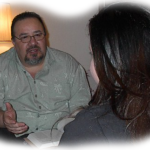Counseling is about hearing the words of a person, and deciphering what they mean, so that the counselor may then use his or her own words to give instruction to that person on how to resolve their concerns. Words are “key” to effective counseling, and “key words” are important to counseling effectively. In this article, I want to cover the issue of “Key Words” and how the counselor may use them.
First of all, a “key” word (in counseling) is a word used in a sentence which prompts a question. For example, the client says, “I think my wife is having an affair.” The key word is “think.” Why? Because without this word, the sentence changes to, “My wife is having an affair.” These two sentences are obviously different. In one sentence, the client is not sure his wife is having an affair; and is sure in the second sentence.
Any good counselor will pay careful attention to how the client is using words, as well as the words themselves. When the counselor ignores the key words in a sentence, he or she will then jump to conclusions as to what the client actually said. When this happens, the counselor is now heading in a direction (in the conversation) which is different from the real problem. If the counselor is not able to identify the real problem, then he or she will not be able to arrive at the correct solution. The answer is found in the problem. If the counselor misunderstands the client’s presentation, then the counselor becomes ineffective in the process. Looking for, and identifying “key words” will make the difference in how effective the counselor will be. The counselor should look for those words which prompt questions. Or, at least those which should prompt questions.
Mary (the client) tells her counselor, “I am unhappy with my life. People’s actions confuse me. I don’t know who to trust. I feel like giving up.” If the counselor is listening, and paying attention to the words used, she will hear one thing. If the counselor is just listening, but not paying attention to the words, she will hear something different. For example, if the counselor is not paying attention to the “key” words, she will think Mary is thinking about suicide. If the counselor reached this erroneous conclusion, then she will start to caution Mary about suicide, and maybe even get religious and admonish Mary that God will not forgive suicide. The counselor will then attempt to convince Mary not to take her own life.
If the counselor actually listened to the words used by Mary, she would reach a different conclusion. Let’s review Mary’s words, and identify the “key” words: “I am unhappy with my life. People’s actions confuse me. I don’t know who to trust. I feel like giving up.” The key words identified are: life, actions, trust, and feel. Now let’s see why these are the “key” words.
LIFE = Mary tells the counselor she is unhappy with her life. The counselor who is not listening will focus on the word “unhappy.” The reason is that it is obviously a statement of emotion in the sentence. The counselor will erroneously assume that the client means something that she may not be saying. The counselor might sympathize (relate to the client’s feelings), as compared to empathize (care about the client without getting emotionally involved), and think that she (the counselor) understands what Mary is saying. The correct response instead would be to question the word, “life.” This prompts several questions:
- What about your life are you unhappy with?”
- Are you meaning your whole life, from birth to the present?
- Are you speaking about specific circumstances in your life?
- Are you speaking of relationships with others (which is what seems to be implied with the rest of her comments).
- Are you saying that you are not happy with the way things have turned out lately?
- And possibly more questions.
ACTIONS = Again, if the counselor did not pay attention to the key words, she will sympathize and focus on the wrong words. Mary’s real concern is not that she is confused, but that she is confused about the actions of others. She is not asking for help to alleviate her confusion, she is complaining about things other people have done. The questions here would be aimed at finding out what these actions are to which she is referring:
- What do you mean by “people’s actions?”
- What have people done that confuses you?
- Do you mean actions which are bad or good or both?
- Has someone hurt you?
- And so on.
TRUST = Again we have a word that prompts feelings, but in this sentence, it is also the “key” word. The careful counselor is not going to be distracted by the word “who” which would change the focus of the sentences from trust issues (which is her real concern) to questions of who is in her life that she is not comfortable with. If we take her “key” word into consideration, then the questions would be more like:
- What does trust mean to you?
- How has your trust been violated?
- Did the other person or persons understand what you were expecting of them?
- Are you saying that you have trouble trusting people in general?
- And so on.
FEEL = In this case, the word “feel,” as used by Mary, does not mean an emotional expression, she is saying that she is on the brink of making a decision to do, or not do, to something. Focusing on her “feelings” will distract the counselor from the real issue. People will often use words that mean one thing to say another. The counselor who is paying attention to the “key words” will catch on to the style of speaking of the client, and learn to question those words or phrases which are unclear.
While anyone can argue that any word can be ambiguous, depending on its use, the careful listener will argue differently. Some words are ambiguous (can have different meanings), careful attention to their use and location in a sentence will help the effective counselor identify their meaning. In some cases, even if the word seems clear, the best course of action is to question it. For example, to you (the counselor) the word “trust” may mean to take someone at their word.” The implication here is that if you trust a person, then you believe their word, and so you have little to no problem doing as they say. To someone like Mary, it could have a completely different connotation. She could be saying that she believes that trusting people will only amount to being hurt by them, so she is unsure of whether she wants to trust people or not. The way you (the counselor) interprets her meaning will affect your progress with her in the counseling.
Therefore, we have to look at all the “key words,” from all the sentences, together: life, actions, trust, and feel. As well, we have to look at the parts of the sentences Mary used to get a feel for what she is actually complaining about. Here are her statements again, “I am unhappy with my life. People’s actions confuse me. I don’t know who to trust. I feel like giving up.”
She presents four different aspects of her complaint:
- She is unhappy.
- She is confused.
- She is unwilling to “trust.”
- She is feeling hopeless.
When we look at these four aspects, and tie them in with her key words (life, actions, trust, and feel), we can finally start getting a better idea of what is happening here. Mary is likely struggling with unfair or exaggerated expectations (to some degree), on her part. Her key words, along with the four aspects taken from her statements, paint a picture which implies that Mary may have had, or is in a, bad relationship, especially with someone she assumed was supposed to be trustworthy. This should lead the counselor to wonder about her relationships and the outcome of the same. Therefore the questions which would then arise would be similar to:
- Is there a particular relationship you are especially concerned with?
- If so, what happened to cause you to distrust the relationship?
- What was it that you were expecting from the relationship?
- What was it that the other person(s) wanted from the relationship?
- What problem did you have with their expectations of you?
I hope that I did not get too involved and lose you in this discourse, but it is extremely important to understand the role “key” words play in counseling. The better the counselor pays attention to the key words and phrases used by the client, the better the counselor will be able to more quickly understand the real issue, as compared to the preconceived problem from the client’s point of view, or the misdiagnosed, and/or misinterpreted, problem as seen by the counselor.
Misinterpretation is the biggest obstacle of all new counselors. They are likely to jump to conclusions, and attempt to resolve the misinterpretation, as compared to dealing with the real problem. The obvious problem with this is that the counselor becomes ineffective at helping the client resolve the real (or root) problem, because they are working on something that may just be a symptom.
So, to summarize:
- Listen carefully.
- Identify the “key” words or phrases.
- Review the client’s statements and identify the various aspects involved.
- Consider the key words and the aspects together.
- Ask the right questions, based on the above.







Hi Pastor Perez, I am a student counsellor with a strong commitment to Christ. currently I am training with an organisation that leans toward the TA approach to counselling. I am not all together comfortable with the secular view of man. I am interested in the ‘Belief Therapy’ you mentioned in one of your articles, how can I get more information on this. Yours in Christ
Everton Harrison
Hi Everton,
To get more information on Belief Therapy, please go to:
The Therapon Institute.